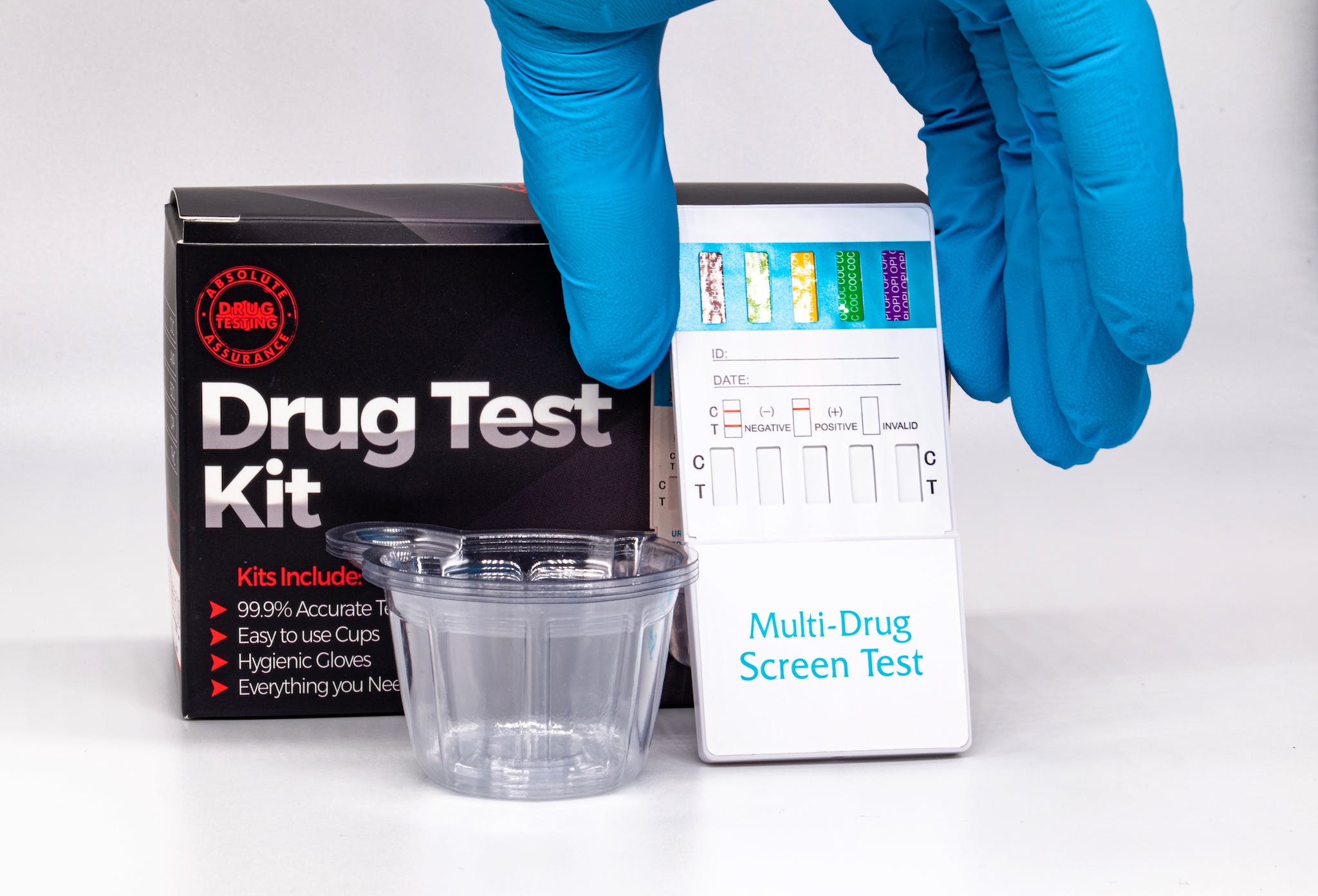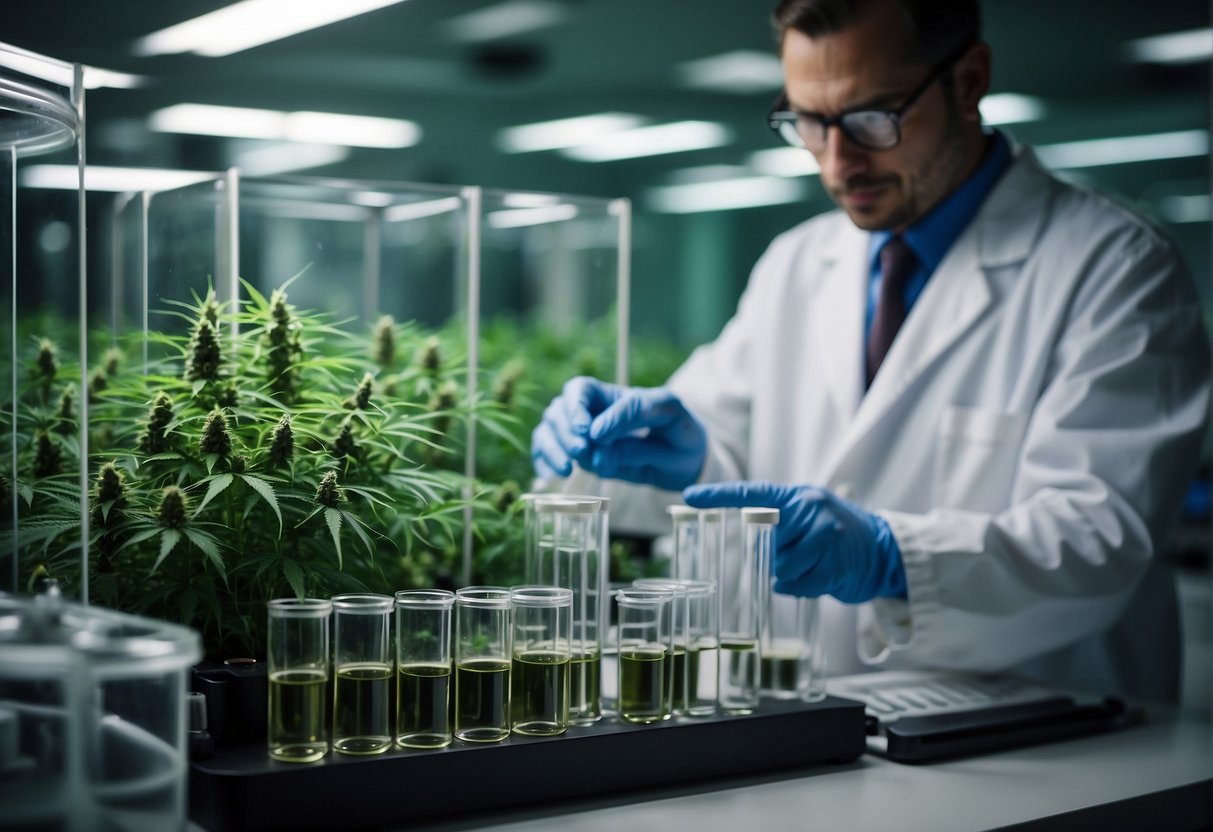Does Delta 8 Show Up on Drug Test? Understanding Detection and Results
Delta-8 THC’s got people buzzing since it’s like its cousin Delta-9 THC, but without making you feel too high. Wondering if Delta-8 could mess up a drug test? That’s huge if your job or something important hangs in the balance. Knowing whether Delta-8 shows on drug tests is key to staying out of trouble. Dive into the specifics on Delta-8 THC and learn why keeping an eye on its effects is big for your peace of mind and your next steps.
- Understanding Delta-8 THC
- Drug Testing Mechanics
- Delta-8 THC and Drug Tests
- Mitigating the Risk of a Positive Test
- Legal Implications and Consumer Safety
- Products Containing Delta-8 THC
- The Role of Delta-8 in Medical Cannabis
- Alternatives to Delta-8 THC
- Consumer Education and Responsibility
- Frequently Asked Questions
- Can delta-8 THC cause a positive result on drug tests?
- What are the detection methods for delta-8 THC in drug screenings?
- How long does delta-8 THC stay in the body?
- Are there ways to quickly metabolize delta-8 to avoid detection on a drug test?
- Do standard drug tests differentiate between delta-8 THC and delta-9 THC?
- What should be considered if undergoing drug testing when legally using delta-8 products?
Most conventional drug tests are designed to detect the presence of metabolites produced from the consumption of Delta-9 THC. However, because Delta-8 and Delta-9 THC are chemically similar, there is a possibility that the use of Delta-8 products can result in a positive drug test. It’s known that drug tests generally do not differentiate between different THC isomers, so the presence of Delta-8 could indeed trigger a positive result. Moreover, the concentration of THC, the specific type of test used, and individual metabolism can all affect the outcome of a drug test.
To navigate this uncertainty, it is important to be aware of the specifics of Delta-8 and its potential to show up on a drug test. Understanding the type of test and the substances it screens for can help you make an informed decision about Delta-8 use. If drug testing is a concern for you, considering the legal status and regulations surrounding Delta-8 in your area is also paramount.
Understanding Delta-8 THC
Before diving into specifics, it’s important for you to understand that Delta-8 THC is a psychoactive cannabinoid similar to Delta-9 THC, the main compound in cannabis that produces euphoric effects. Knowing its chemical structure and legal status will give you a clearer picture of its implications.
Chemical Structure and Effects
Delta-8 THC (Δ8-THC), not to be confused with the more renowned Delta-9 THC (Δ9-THC), is one of over a hundred cannabinoids found in the cannabis plant. Chemically, the difference between Delta-8 and Delta-9 THC is the location of a double bond on the chain of carbon atoms, which is found on the eighth carbon for Delta-8, and the ninth for Delta-9. Despite this slight difference, Delta-8 THC still binds to the same cannabinoid receptors in your body, namely CB1 and CB2 receptors, leading to psychotropic effects, though they tend to be less potent compared to its Delta-9 counterpart.
Effects You Might Experience:
- Euphoria: A less intense but still noticeable feeling of happiness and well-being.
- Relaxation: Many report a calmer demeanor after consumption.
- Pain Relief: Delta-8 THC may offer analgesic effects.
- Appetite Stimulation: Similar to other cannabinoids, it may increase your appetite.
Legality and the 2018 Farm Bill
The legality of Delta-8 THC is a gray area due to the nuances of federal law, particularly the 2018 Farm Bill. This piece of legislation removed “hemp” – cannabis plants containing less than 0.3% Delta-9 THC on a dry weight basis – and derivatives of such plants, from the definition of marijuana in the Controlled Substances Act. Hence, products derived from hemp, including Delta-8 THC, could theoretically fall into a legal loophole if they meet certain criteria.
What You Should Know:
- Hemp-derived vs. Cannabis-derived: Hemp-derived Delta-8 is in a legal gray area, while cannabis-derived Delta-8 remains federally illegal.
- State Laws: Your state’s legislation might differ from federal law, with some states explicitly banning Delta-8 THC regardless of its source.
- Market Regulation: The market for Delta-8 THC is not well-regulated, leading to variability in product quality and legality.
It is crucial for you to stay abreast of both federal and state laws to determine the legality of Delta-8 THC in your particular jurisdiction. Remember, even if legal under federal law, your state law has the final say in its accessibility and regulation.
Drug Testing Mechanics

When facing a drug test, it’s essential to understand its mechanics, which can detect the presence of substances like Delta 8 THC among others. Different types of tests have varying detection windows for cannabinoids and their metabolites.
Types of Drug Tests
Urine tests are the most commonly administered type of drug tests due to their non-invasiveness and longer detection windows. Blood tests can reveal recent use, while saliva tests are gaining popularity for their ease of use and quick results. Hair tests can potentially detect drug use over the longest period, up to several months after ingestion.
Detection of Cannabinoids
Drug tests are designed to detect specific substances within your body, including THC, CBD, and other related compounds. Delta 8 THC, structurally similar to Delta 9 THC, might not be distinctly identified by all drug tests, but could still result in a positive due to its resemblance to THC metabolites.
THC Metabolites and Their Lifespan
After ingestion, THC is broken down into several metabolites, which can linger in your system. The lifespan of these metabolites can vary, with urine tests often capable of detecting remnants of THC for up to 30 days, depending on the frequency of use and individual metabolism. Blood and saliva tests have a shorter detection window, ranging from a few hours to a couple of days, while hair tests may show traces for considerably longer, even up to 90 days.
Delta-8 THC and Drug Tests

Delta-8 THC is a compound found in cannabis plants that can potentially be detected in drug tests. Understanding its detectability and the factors influencing drug test results is essential if you aim to pass a drug test.
Potential to Show on Tests
Delta-8 THC, similar to the more well-known delta-9 THC, may show up on a drug test. This is due to the fact that many standard drug tests designed to detect cannabis use are not able to distinguish between different THC isomers. If you have used a product containing delta-8, be aware that it could lead to a positive test for THC. Studies such as one published in the Journal of Analytical Toxicology conclude that delta-8 metabolites can trigger positive results even on basic urine drug screen immunoassays originally intended to detect delta-9 THC metabolites.
Factors Affecting Drug Test Results
Several factors can influence whether delta-8 will be detected in a drug test:
- Metabolism: Your metabolism plays a key role in how quickly your body processes and eliminates THC.
- Weight: Since THC is fat-soluble, individuals with a higher body fat percentage may retain cannabinoids longer.
- Frequency of Use: Regular users of delta-8 products may have accumulated levels that are more likely to be detected.
- Type of Drug Test: Different tests (urine, blood, hair, saliva) have varying detection windows and sensitivity levels.
To improve your chances to pass a drug test, some opt for detox methods, though their efficacy and safety are not always guaranteed. It is crucial to consider legal and health implications when using substances such as delta-8 THC.
Mitigating the Risk of a Positive Test
When considering the possibility of Delta 8 THC appearing on a drug test, addressing the risk of a positive result involves strategic planning and understanding the specifics of drug testing protocols.
Detoxification Strategies
To reduce the chance of a positive drug test, you may explore various detoxification strategies. These include using detox products that are designed to cleanse your system. However, it’s essential to approach these products critically, as their efficacy can vary. Hydration is a key factor in detoxification, with increased water intake helping to flush out toxins. Combining hydration with regular exercise can potentially accelerate the process, yet be cautious to not overhydrate or overexert yourself. The safest and most sure-fire method to detox is to simply abstain from using Delta 8 products for a sufficient period before a test.
Understanding Testing Thresholds
It’s vital to recognize that drug tests have specific thresholds for detection. These cutoff levels are set to avoid false positives from minute trace amounts. You should familiarize yourself with the testing sensitivity of the specific drug test you’ll be undergoing, as tolerance levels can affect test outcomes. For instance, a urine test typically detects THC metabolites, rather than the presence of the compound itself. Remember, the key to mitigating risk lies in knowing how long Delta 8 may remain detectable in your system and planning accordingly.
Legal Implications and Consumer Safety
As you explore the landscape of cannabis products, understanding the legal implications and consumer safety aspects of Delta-8 THC is critical, particularly in relation to drug testing and regulatory status.
Delta-8 THC Regulation
At the federal level in the United States, Delta-8 THC occupies a complex legal status. While derived from hemp, Delta-8 is not explicitly addressed in the 2018 Farm Bill, which legalized hemp and its extracts. However, if synthesized from CBD, it could be considered a controlled substance due to the synthetic process involved. The Drug Enforcement Administration (DEA) classifies Delta-8 under Schedule I substances, making its legality ambiguous. Keep in mind that regulation can vary widely at the state level, so checking your local laws is imperative. Consulting with a healthcare provider can also provide guidance on legal use and how it may affect drug testing outcomes.
- Check Local Laws: Legal status differs from state to state.
- Consult Healthcare Providers: Get professional advice on legality and drug testing.
Side Effects and Risks
Delta-8 THC is known for its psychoactive effects, similar to Delta-9 THC, the primary compound in marijuana. Although some consume it for these effects, it’s important to be aware of the potential side effects and risks. Users have reported effects that include dry mouth, red eyes, and short-term memory impairment. Less is known about the long-term risks, but Delta-8 products, especially those not tested properly, could potentially contain toxic substances. From a consumer safety perspective, this lack of regulation and potential for impurities means you should exercise caution when purchasing these products, prioritizing those from reputable sources with comprehensive testing.
- Be Aware of Effects: Similar to Delta-9 THC, but with possible unique risks.
- Prioritize Tested Products: Look for products from sources that conduct thorough testing.
Products Containing Delta-8 THC
Delta-8 THC has become a noteworthy cannabinoid found in various hemp and cannabis products. While it’s structurally similar to Delta-9 THC, the primary psychoactive compound in marijuana, Delta-8 offers a milder effect and is found in legal hemp-derived products.
Common Products on the Market
You’ll find a variety of Delta-8 THC products in the market today, each varying in potency and form. The most common types include:
- Gummies: These are sweet, chewable treats infused with Delta-8 THC, offering pre-measured doses for convenience.
- Tinctures: These are liquid extracts that you can take sublingually (under the tongue) or add to food and beverages.
- Edibles: Beyond gummies, Delta-8 is also incorporated into a broader range of edibles such as chocolates and baked goods.
Delta-8 edibles and other products are often labelled with their Delta-8 THC content in milligrams, helping you understand the dosage and potency of what you’re consuming.
Consumption Methods and Dosage
When using Delta-8 THC products, you have several consumption methods to choose from:
- Oral Intake: Gummies and other edibles pass through your digestive system, leading to a delayed onset but potentially longer-lasting effects.
- Sublingual: Tinctures absorbed under the tongue can take effect more quickly than edibles, as they enter the bloodstream directly.
The dosage of Delta-8 THC can vary significantly depending on the product’s potency and your individual tolerance. It’s common to start with a small dose, such as 10-25 milligrams, and adjust as needed. Always read the product label carefully to determine the right dosage for you.
The Role of Delta-8 in Medical Cannabis

Delta-8 tetrahydrocannabinol, commonly known as Delta-8 THC, is an emerging cannabinoid that has captured interest in the medical cannabis industry due to its distinctive therapeutic properties. It interacts with your body’s endocannabinoid system similarly to Delta-9 THC, the more commonly known form of THC, but with less psychoactive intensity, potentially offering benefits to users seeking relief without strong euphoria.
Therapeutic Benefits and Uses
Delta-8 THC has been reported to offer relief from pain and inflammation, attributes that are valuable for individuals dealing with chronic pain. The compound engages with cannabinoid receptors in the nervous system, potentially influencing the perception of pain and offering an alternative to traditional pain management strategies.
Anecdotal evidence suggests that Delta-8 THC might assist in reducing anxiety, owing to its capability to bind to CB1 receptors in the brain that play a role in regulating mood and anxiety levels. However, scientific research is ongoing to fully understand its anxiolytic effects.
The interaction of Delta-8 THC with the endocannabinoid system may have promising implications for conditions involving cannabinoid deficiency. By supplementing cannabinoids like Delta-8 THC and cannabidiol (CBD), users may be able to help restore balance within this critical physiological system.
Some studies and user experiences indicate that Delta-8 THC may also help mitigate inflammation, which is a key player in many health conditions. Through its action on CB2 receptors, which are primarily located in the peripheral tissues of the body, Delta-8 THC could potentially modulate the body’s inflammatory response.
Medical marijuana advocates often cite the importance of the “entourage effect,” where Delta-8 THC, along with other cannabinoids and terpenes found in the plant, work in synergy to enhance therapeutic outcomes. When considering medical cannabis, your personal experience and consultation with healthcare professionals are crucial in understanding how Delta-8 might play a role in your health regimen.
Alternatives to Delta-8 THC
When considering alternatives to Delta-8 THC, you have options that range from non-psychoactive cannabinoids like CBD to legal cannabis products containing Delta-9 THC, depending on your needs and the legal status of cannabis in your area.
CBD and Other Non-Psychoactive Cannabinoids
Cannabidiol (CBD) is a compound found in the Cannabis sativa plant that does not produce the psychoactive effects associated with THC. CBD can be derived from both marijuana and industrial hemp, the latter being legal at the federal level due to its low levels of Delta-9 THC. CBD products come in various forms, from oils to edibles, and they might be a suitable alternative if you’re looking for relief without the high.
- Benefits include anxiety reduction, pain relief, and improved sleep.
- Legal status: Federally legal when derived from hemp with less than 0.3% THC.
Exploring Legal Cannabis Options
For those in areas where recreational marijuana is legal, products containing Delta-9 THC could be a lawful alternative to Delta-8 THC. Delta-9 THC is the primary psychoactive component in cannabis and is responsible for the ‘high’ associated with marijuana use.
- Products might include:
- Flowers (buds)
- Edibles
- Concentrates
- Considerations:
- Always check your local laws regarding marijuana use.
- Start with a low dose if you’re new to Delta-9 THC, as its effects can be more potent than Delta-8 THC.
Remember, while hemp-derived CBD is widely accessible, the legality of marijuana and its derivatives like Delta-9 THC can vary significantly by state or country. Always ensure you’re informed about the regulations in your jurisdiction.
Consumer Education and Responsibility
As you navigate the landscape of cannabis products, such as delta-8 THC, it’s vital to educate yourself about how these substances interact with drug testing. Understanding the evidence and following guidance for responsible use will help you make informed decisions and potentially avoid unexpected results on a drug test.
Research and Evidence
Delta-8 THC is a cannabinoid derived from hemp that is chemically similar to delta-9 THC, the primary compound in cannabis responsible for its psychoactive effects. Scientific research into delta-8’s metabolites suggests that it can produce similar byproducts to delta-9 THC once processed by your body, which may be detectable on drug tests. However, evidence is not yet comprehensive, as studies are ongoing to fully understand how delta-8 THC is metabolized.
When preparing for a drug test, be cautious and consider the current evidence—do not rely solely on anecdotal claims. It’s best to assume that delta-8 could lead to a positive drug test, as many drug tests are not sophisticated enough to distinguish between different cannabinoids.
Guidance for Responsible Use
Before using any delta-8 products, consult your healthcare provider to discuss individual factors that might influence drug test results, such as metabolism, dosage, and frequency of use. If you are required to pass a drug test, the safest recommendation is to abstain from using delta-8 products.
Be mindful that recommendations for responsible use of delta-8 might vary depending on your location, as legal status and regulations can differ by jurisdiction. Always purchase products from reputable sources to ensure their quality and labeling accuracy. Remember, you are responsible for what you put into your body, and with the legal status of cannabinoids like delta-8 in flux, staying informed is the best way to protect yourself.
Frequently Asked Questions
Understanding the implications of delta-8 THC on drug tests is crucial if you are using these products, whether for recreational or medicinal purposes.
Can delta-8 THC cause a positive result on drug tests?
Delta-8 THC can trigger a positive result on a drug test, as most standard drug screenings are designed to detect metabolites of THC, which are present following the use of delta-8.
What are the detection methods for delta-8 THC in drug screenings?
Drug screenings often use immunoassay tests with antibodies that are sensitive to THC metabolites. These tests do not typically distinguish between different analogs of THC, detecting both delta-8 and delta-9.
How long does delta-8 THC stay in the body?
The detectable window for delta-8 THC in the body varies based on frequency of use, body metabolism, and the type of test conducted. Generally, THC can be detected in urine for up to 30 days after use.
Are there ways to quickly metabolize delta-8 to avoid detection on a drug test?
While there are anecdotal claims about methods to hasten the metabolism of THC, such as through hydration or exercise, scientific evidence on quickly eliminating THC from the system to avoid detection is limited.
Do standard drug tests differentiate between delta-8 THC and delta-9 THC?
Standard drug tests generally do not differentiate between delta-8 THC and delta-9 THC. These tests detect the presence of THC metabolites rather than the specific form of THC consumed.
What should be considered if undergoing drug testing when legally using delta-8 products?
If legally using delta-8 products, being aware of the legal and employment implications of a positive drug test is important. Consider consulting with legal or healthcare professionals regarding the use of these products if facing a drug test.










